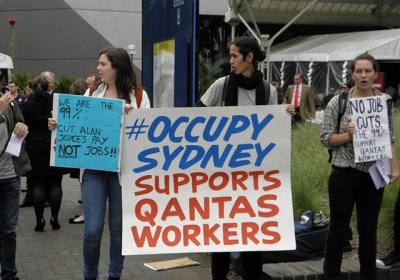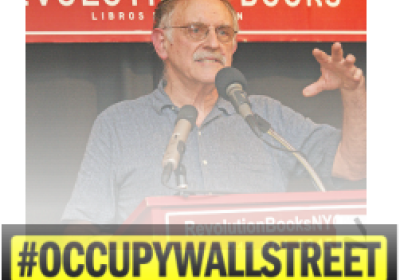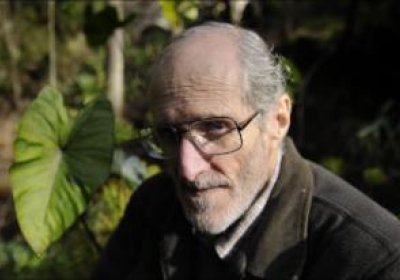Before the first Australian occupations following the example of Occupy Wall Street began on October 15, even some of the activists involved wondered if it would work. After all, this was the “lucky country” that escaped the global financial crisis.
But thousands of mostly young people rocked up to launch Occupy Melbourne in City Square, and a further 1000 launched Occupy Sydney in Martin Place in the heart of the city’s financial district. Hundreds launched Occupy Brisbane in Post Office Square.
Analysis
Veteran Brisbane activist Gary McLennan spoke at an Occupy Brisbane rally on November 5. An abridged version of his speech is below.
* * *
Friends, I want to thank you sincerely for the invitation to speak to you today. It remains for me a badge of honour, a great honour, that I’ve been asked twice to speak to the Occupy Brisbane movement.
I said when I first spoke to you that your movement represented the best hope for the kind of world that I wanted my grandchildren to grow up in.
I believed that then and I still believe it now.
The strengthening links between unions and the US Occupy movement will be expressed in mobilisations across the US on November 17.
US author and ecosocialist Joel Kovel gave the speech below to Occupy Wall Street at New York’s Zuccotti Park on October 28.
* * *
I am honoured to be here this evening because you are the light of the world. I’m not saying this to flatter, but because we have to understand it deeply. Your genius has been to seize upon the emerging hopes of humanity and give them a form of realisation.
Now you are on the threshold of a world-transforming process, and you must decide whether to cross over it.
The United States isn't broke; we're the richest country on the planet and a country in which the richest among us are doing exceptionally well. But the truth is, our economy is broken, producing more pollution, greenhouse gasses and garbage than any other country.
Professor of Linguistics and political activist Noam Chomsky is presented with the 2011 Sydney Peace Prize at a gala dinner held in his honour at Sydney University on November 3, 2011.
Green Left Weekly’s Jonathon Rutherford spoke to Australian environmentalist and author Ted Trainer about capitalism, affluence, the limits to growth and how we can move to a better society.
* * *
Today most environmentalists, including most on the left, think that the main barrier preventing a smooth transition to renewables is political, not technical. Against this powerful belief you have argued that consumer-capitalist society cannot be sustained by renewables alone. Can you briefly explain why?
Port Augusta Mayor Joy Baluch gave the speech below at an October 29 community forum sponsored by the Climate Emergency Action Network SA, Beyond Zero Emissions and the Port Augusta City Council.
* * *
Australian history shows that visionaries are few and far between when it comes to building the infrastructure of this nation.
Links International Journal of Socialist Renewal, Oct 30: Let me start by introducing you to the Palestinian people and give you a brief background to the conflict.
Palestinians are the indigenous inhabitants of the land that was once known as Palestine — and is now called Israel and the Occupied Territories. Palestinians were mostly a population of farmers — fellaheen — their view of their identity is therefore defined by their connectedness to the stones, the earth and the trees.
Free Gaza Australia released this open letter to Australian Prime Minister Julia Gillard on November 7.
* * *
Dear Prime Minister Gillard,
Many people in Australia have been organising an Australian contingent to join the Freedom Wave to Gaza initiative which left Turkey late last week. As you would be aware, two boats full of unarmed civilians carrying solidarity messages, medical aid and extending the hand of friendship were attacked by Israeli military in an act of piracy in international waters.
Seven Aboriginal community leaders from the Northern Territory released the statement below on November 4.
* * *
United First People’s Law men and women who are born leaders representing people of Prescribed Areas in the Northern Territory make this statement. Once again, they have gathered to openly discuss the future of our generation who have been subjugated by the lies and innuendo of the federal government, set out in the Stronger Futures document (October 2011).
Sydney Peace Blog — The 2011 City of Sydney Peace Prize Lecture was delivered to a sold-out crowd at Sydney Town Hall on Wednesday November 2 by the 2011 Sydney Peace Prize Recipient Professor Noam Chomsky.
The full text of Chomsky’s lecture, titled Revolutionary Pacifism: Choices and Prospects, is below.
* * *
- Previous page
- Page 424
- Next page











